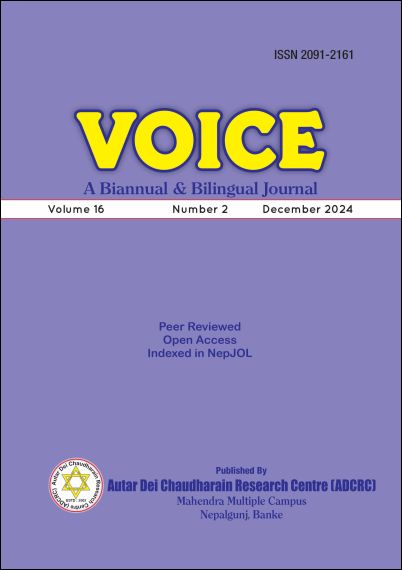Ecofeminist Appeal in Shreedhar Lohani's Gaia
DOI:
https://doi.org/10.3126/voice.v16i2.72771Keywords:
ecofeminism, feminism, Gaia, hierarchical, matrifocal, physiological systemAbstract
This research article examines Shreedhar Lohani's poem "Gaia" through the lens of ecofeminism, a literary theory that blends feminist ideology with ecological concerns, emphasizing the interconnectedness of the oppression of women and nature. Lohani's use of the term "Gaia," derived from Greek mythology, symbolically represents the Earth as a living, self-regulating organism. The poem reflects Gaia's maternal and nurturing qualities, yet highlights the consequences of human interference with her natural balance. Through an ecofeminist perspective, this study delves into how Lohani personifies the Earth as a female figure and how her suffering parallels that of women marginalized by patriarchal systems. The poem suggests that Gaia, despite being deeply wounded by environmental exploitation, still holds out hope that humanity will heed her warnings and take steps toward restoration. This study primarily employs a qualitative and descriptive research methodology, which involves close reading and textual analysis of Lohani's poem. It also relies on secondary sources, including books, journal articles, and online materials that explore both ecofeminist theory and Lohani's body of work. The methodology further includes a comparative approach, examining the symbolic relationship between nature and gender in the context of ecofeminism. This paper underscores the importance of respecting both the environment and women's rights to sustain a harmonious ecological balance, highlighting the relevance of ecofeminist ideas in contemporary ecological and gender discourses.
Downloads
Downloads
Published
How to Cite
Issue
Section
License
Copyright (c) 2024 Author

This work is licensed under a Creative Commons Attribution-NonCommercial 4.0 International License.
CC BY-NC: This license allows reusers to distribute, remix, adapt, and build upon the material in any medium or format for noncommercial purposes only, and only so long as attribution is given to the creator.




